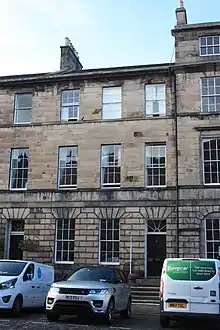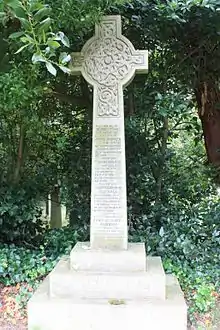Lord St Vigeans | |
|---|---|
| Chairman of the Scottish Land Court | |
| In office 1918–1934 | |
| Preceded by | Lord Kennedy |
| Succeeded by | Lord MacGregor Mitchell |

David Anderson, Lord St Vigeans (26 October 1862 – 1 June 1948) was a Scottish advocate and judge. He served from 1918 to 1934 as the second Chairman of the Scottish Land Court.[1]
Early life

Anderson was born on 26 October 1862.[1] He was the son of Dr Joseph Anderson (1832–1916), an antiquarian who later served as keeper of the National Museum of Antiquities of Scotland from 1870 to 1913.[1][2][3] His mother was Jessie Dempster.[4]
Career
Anderson was called to the Scottish bar in 1891.[1] He was appointed as Sheriff of Dumfries and Galloway in March 1913,[5] and in June 1913 he became a King's Counsel.[1][6] In August 1917, he became Sheriff of Renfrew and Bute.[7]
In May 1918 he relinquished the post as sheriff to become Chairman of the Scottish Land Court, taking the judicial title of Lord St Vigeans.[1] The title was derived from the ancient village of St Vigeans in Forfarshire, where his father had been educated.[8] He succeeded the deceased Lord Kennedy,[9] having twice served as temporary Chairman during periods of Kennedy's absence, in July 1914[10] and December 1915.[11]
After 16 years as Chairman, Anderson submitted his resignation from the Land Court in early October 1934,[12] and retired from the bench on 1 November 1934. He was succeeded by Robert Macgregor Mitchell.[13][14]
In June 1935 he was awarded an honorary doctorate of Law by the University of Edinburgh.[15]
Personal life
In 1898 Kennedy married Emma Millar Robertson, daughter of James Robertson of Edinburgh. They had one son, James, who was killed in a motorcycle accident in 1922.[1][3]
Death
Anderson died in Edinburgh on 1 June 1948, aged 85.[1]
He is buried with his parents amongst the trees in the section north of the vaults in Warriston Cemetery.[3]
References
- 1 2 3 4 5 6 7 8 "Lord St. Vigeans". The Times. No. 51087. London, England. 2 June 1948. p. 6. Retrieved 3 January 2016 – via The Times Digital Archive.
- ↑ Ritchie, Graham; Ritchie, Anna (1991). Scotland, Archaeology and Early History (2nd ed.). Edinburgh University Press. p. 9. ISBN 978-0748602919. Retrieved 3 January 2016.
- 1 2 3 Clarke, DV (2002). "The foremost figure in all matters relating to Scottish archaeology': aspects of the work of Joseph Anderson" (PDF). Proceedings of the Society of Antiquaries of Scotland. 132: 1–18. doi:10.9750/PSAS.132.1.18. S2CID 163285162. Retrieved 1 January 2018.
- ↑ Anderson grave, Warriston Cemetery
- ↑ "No. 12545". The Edinburgh Gazette. 11 March 1913. p. 282.
- ↑ "No. 12571". The Edinburgh Gazette. 10 June 1913. p. 613.
- ↑ "No. 13123". The Edinburgh Gazette. 3 August 1917. p. 1575.
- ↑ "Lord St. Vigeans". The Times. No. 41787. London, England. 11 May 1918. p. 3. Retrieved 3 January 2016 – via The Times Digital Archive.
- ↑ "No. 30668". The London Gazette. 3 May 1918. p. 5360.
- ↑ "No. 12684". The Edinburgh Gazette. 7 July 1914. p. 769.
- ↑ "No. 12882". The Edinburgh Gazette. 4 December 1915. p. 1882.
- ↑ "Scottish Land Court". The Times. No. 46874. London, England. 2 October 1934. p. 14. Retrieved 3 January 2016 – via The Times Digital Archive.
- ↑ "News in Brief: Scottish Land Court". The Times. No. 46899. London, England. 31 October 1934. p. 16. Retrieved 3 January 2016 – via The Times Digital Archive.
- ↑ "No. 15118". The Edinburgh Gazette. 2 November 1934. p. 901.
- ↑ "University News". The Times. No. 47103. London, England. 29 June 1935. p. 19. Retrieved 3 January 2016 – via The Times Digital Archive.